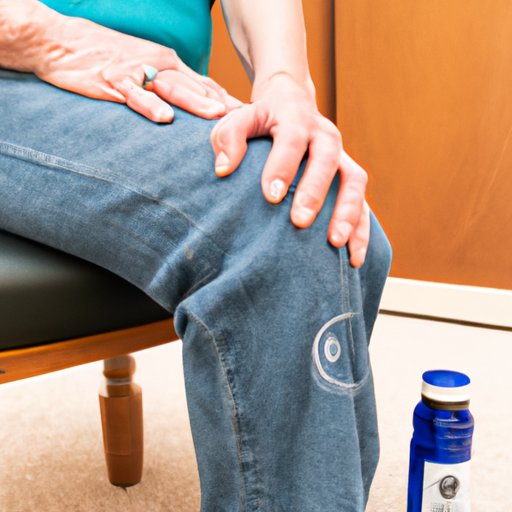
Introduction
Diverticulitis is a condition that occurs when small bulging pouches develop in the lining of the digestive system. While diverticulitis is often a manageable condition, it can be accompanied by significant pain. In this article, we’ll discuss some tips and recommendations for relieving diverticulitis pain as quickly as possible.
Dietary Changes
One of the most important ways to manage diverticulitis pain is to make changes to your diet. Here are some key considerations:
Low-Fiber or Clear Liquid Diet
When experiencing a flare-up, it may be recommended that you adopt a low-fiber or clear liquid diet, at least temporarily. This can help reduce the load on your digestive system, allowing your body to heal. Some examples of foods that might be incorporated into this type of diet include broth, gelatin, and clear juices.
Foods to Avoid
Some foods can exacerbate diverticulitis symptoms. During a flare-up, it’s generally recommended that you avoid foods that are high in fiber, as well as nuts, seeds, and popcorn. It can also be helpful to steer clear of dairy, red meat, and fried dishes, as these can be difficult to digest.
Importance of Staying Hydrated
Drinking plenty of water is crucial when managing diverticulitis symptoms. This is true regardless of whether you are following a low-fiber or clear liquid diet. Staying hydrated will help your digestive system flush out any harmful toxins and allow it to function effectively.
Medications
Over-the-counter pain relievers can often be effective at reducing diverticulitis pain. Some people also benefit from stronger prescription medication.
Over-the-counter Pain Relievers
Commonly used OTC medications for managing diverticulitis symptoms include acetaminophen, ibuprofen, and naproxen. These drugs can be quite effective at reducing pain and inflammation, but be sure to follow label directions carefully and consult with a medical professional if you have any questions.
Stronger Prescription Medication
If your diverticulitis pain is more severe, your doctor may recommend a prescription medication. These drugs can be highly effective, but they can also come with side effects. Some commonly prescribed medications for managing diverticulitis pain include antibiotics, antispasmodics, and opioids.
When to Consult a Doctor
If your diverticulitis pain is not responding to OTC medication or other home remedies, it’s important to contact a medical professional right away. Additionally, if you experience symptoms such as fever, vomiting, or difficulty passing stool, it’s important to seek medical attention right away.
Physical Activity
Exercise has been shown to alleviate diverticulitis pain in some people. Here are some things to keep in mind when considering physical activity:
How Exercise Can Alleviate Diverticulitis Pain
Physical activity can help stimulate the digestive system and reduce pressure on the colon. Exercise can also promote healthy bowel movements, which can alleviate symptoms associated with diverticulitis.
Recommended Forms of Physical Activity
Low-impact activities like brisk walking, swimming, and cycling can be beneficial for diverticulitis pain. Yoga can also promote healthy digestion and reduce inflammation. However, it’s important to consult with a medical professional before beginning any new exercise routine.
Precautions to Consider Before Exercising
Diverticulitis can cause significant pain, so it’s important to listen to your body and avoid any exercises that cause discomfort. Additionally, it’s important to stay hydrated and take things slowly. If you’re experiencing a flare-up, it might be best to take a break from exercising until symptoms have subsided.
Heat Therapy
Heat therapy can be another effective way to manage diverticulitis pain. Here’s what you need to know:
How Heat Therapy Works to Soothe Diverticulitis Pain
Applying heat to the affected area can help dilate blood vessels, which can increase blood flow and promote healing. Heat can also stimulate the release of endorphins, which are natural painkillers.
How to Apply Heat Therapy
To apply heat therapy, you can use a hot water bottle, warm compress, or heating pad. Apply the heat to the affected area for 10-15 minutes at a time, several times throughout the day. Keep in mind that heat can increase inflammation, so be sure to monitor your symptoms closely.
Precautions to Consider
Like with any other treatments, heat therapy comes with some risks. If you are pregnant, suffer from a heart condition, and/or have impaired temperature sensation in the affected area, you should probably avoid heat therapy.
Rest
Rest is essential for healing from diverticulitis. Here are some tips:
Importance of Rest in Diverticulitis Recovery
Diverticulitis can be an exhausting condition, so make sure to give your body enough time to recover. Get plenty of sleep, and refrain from activities that may exacerbate your symptoms. Taking a break from exercise, highly processed foods, and stressful situations can help you recover quicker.
Recommended Rest Duration and Activities to Avoid
Unfortunately, there is no definitive timeline for diverticulitis recovery. The duration of rest that will be required may vary, depending on the severity of your symptoms. However, it is recommended that you allow yourself enough time for healing and avoid any activities that might cause additional trauma to your colon.
Incorporating Rest into Daily Routine
Consider incorporating rest into your daily routine by allowing yourself enough time for sleep while avoiding unusually high levels of physical and emotional stress. Make sure to schedule activities that are low-impact, like reading a book or taking a relaxing bath. These activities help you recover without hindering your daily routine.
Conclusion
Diverticulitis pain can be intensely debilitating. However, in some cases, adopting certain lifestyle changes, such as staying hydrated and making adjustments to your diet or exercise routine, can help alleviate pain and promote healing. Always follow your doctor’s advice, stay vigilant, and be sure to seek medical attention if pain persists.





